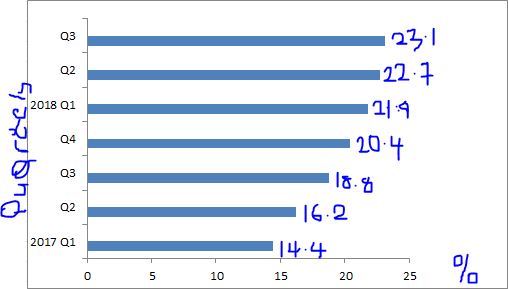Causes of Unemployment In Nigeria

Nigeria’s unemployment rate has been increasing yearly for the past five years. The Minister of Labour and Employment said in an article that Nigeria’s unemployment rate would reach 33.5 per cent by 2020. A new metric is now used to measure the unemployment rate in Nigeria, and now the rate stands at 5.0%.

This national issue calls for stakeholders in the country to look at the causes of unemployment and find a way to find a lasting solution to it.
I cannot talk about unemployment without defining what it is and the types we have in Nigeria. It is a state of being available to work, but you aren’t working, even part-time or temporary. The common types we have in Nigeria include
- Underemployment
- Frictional unemployment
- Structural unemployment
Of the three types I mentioned, underemployment is the most common in Nigeria. It is a situation in which people take up any job to make ends meet, but they are not working to their full capacity or skill level, i.e., working to survive.
As I have mentioned above, the rate is on the increase, and there is a need to know the causes before a solution can be proffered and this is the essence of this article
Causes
Poor economy: This is one of the causes of unemployment in Nigeria. According to an overview by the World Bank, the economic growth in Nigeria has remained muted.
Growth rate is too low to lift the bottom half of the population out of poverty because it averaged 1.9% in 2018 and remained stable at 2% in the first half of 2019. (Source: https://www.worldbank.org/en/country/nigeria/overview)
This report by the World Bank suggests to us that the solution to unemployment in Nigeria is still in view because our economy is underperforming.
Lack of employable skills: A report published by the World Economic Forum 2018 states that only people equipped with future-proof skills can take advantage of new opportunities through continuous retraining and upskilling. What the report is saying is that people with the required skills are the ones that will seize the opportunities the fourth industrial revolution will present.
What the report is saying is that people with the required skills are the ones that will seize the opportunities the fourth industrial revolution will present.
Even if there isn’t a revolution in the industries, there are skills every employer is looking for in their employee, and if you don’t have such skills, you may find it difficult to get the job of your dreams.
Read: List of lucrative skills in Nigeria
More graduates than available jobs: Employment creation in Nigeria remains weak and is not sufficient to absorb the fast-growing labor force, resulting in a high rate of unemployment.
According to a report, Nigerian tertiary education institutions produce up to 500,000 graduates every year, and 47% of the country’s university graduates are unemployed. (Source: https://qz.com/africa/603967/about-half-of-the-university-graduates-in-nigeria-cannot-find-jobs/)
The collapse of the manufacturing sector: One of the ways to reduce unemployment is to increase the number of manufacturing sectors in the country. However, the reverse is the case in Nigeria.
Neglect of the agricultural sector: The agricultural sector can absorb more labour force, but it has faced different challenges for years. The growth in this sector has been hampered by the continued insurgency in the Northeast and ongoing farmer-herdsmen conflicts.
Leadership and managerial problem: Unfortunately, Nigeria lacks leaders with the willpower to tackle the national problem. Despite promises to tackle unemployment in Nigeria, our leaders are only interested in embezzling and engaging in all forms of corruption rather than solving the country’s immediate problem.
Rapid population growth: The population growth in Nigeria has averaged 2.6% annually. If the population grows at a rate not as high as the employment creation, there won’t be any cause for alarm. However, the number of people has outnumbered the available resources, so the mountain has a problem.
Inadequate youth development programs: Different organizations and even the government have developed some youth empowerment programs, but they aren’t sufficient because of our high number of youths in this country. The Nigerian population has reached 180 million, with over half of its people under 30. Their effort is like a drop of water in the ocean.
You may like to read: List of high paying companies and MDAs in Nigeria
